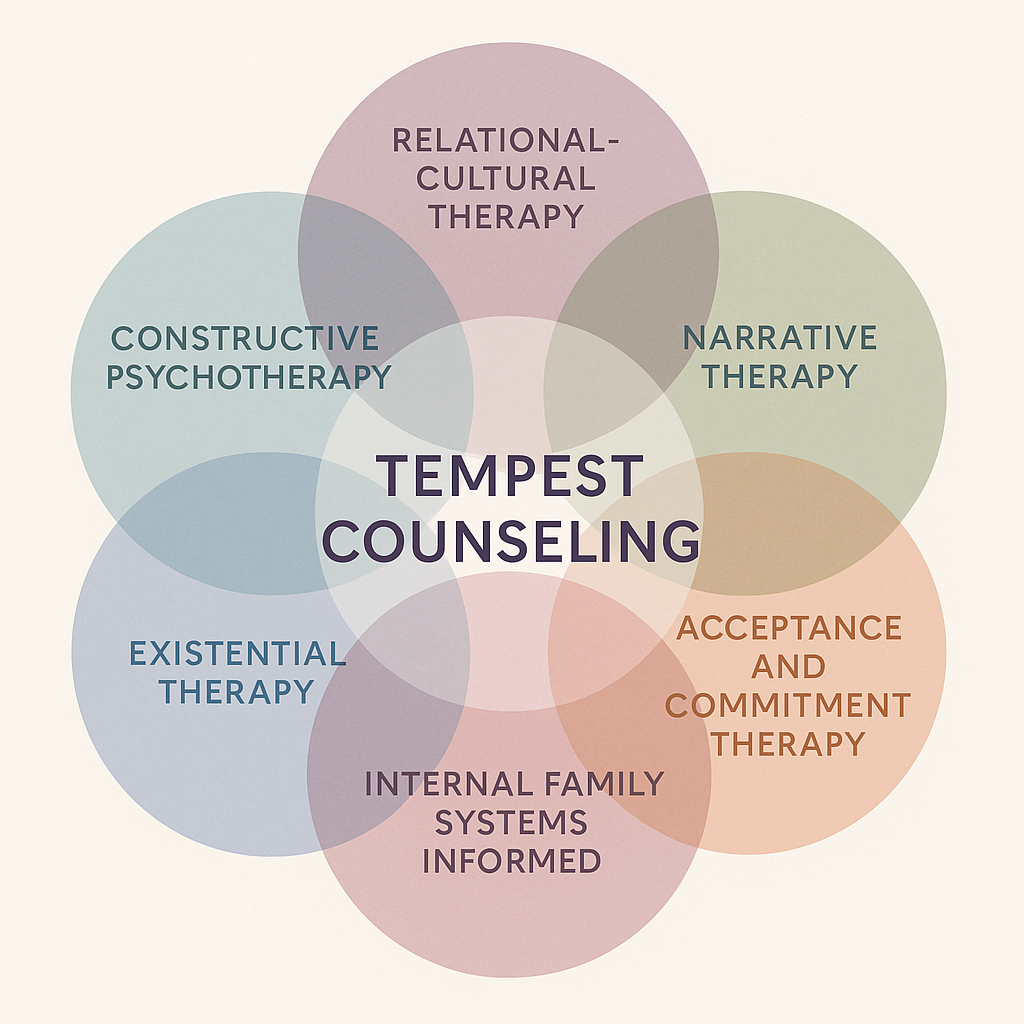
tem·pest | “a violent storm”
Your storm is not chaos—it’s the current carrying you back to your authentic self.
The Tempest We all Try to Tame
Many of us live with a storm of painful thoughts and emotions swirling in our minds and bodies. We often try our whole lives to find an off switch — something that will finally stop the feelings that make a mess of our lives.
Therapy often begins as another attempt to fix the chaos. But the truth is, the parts we want to silence are often the same parts that hold our deepest longings for connection, meaning, and aliveness.
What we can do instead — Curiosity & Compassion
At Tempest Counseling, the goal isn’t to fix you — because you’re not broken. You’re a person who’s been surviving, often in the best ways you knew how.
Together, we’ll turn toward the storm with curiosity and compassion. We’ll explore your story to understand how where you’ve been, while also charting a path for where you would like to go. Gently, at your own pace, we will reconnect you with the parts of you’ve lost or learned to avoid to deepen your authentic connection to yourself.
This isn’t about becoming someone else. It’s about becoming more you. And you don’t have to do it alone.
The Nitty Gritty of What I Do
My approach is integrative and deeply relational, grounded in the belief that healing happens through genuine connection. I often use parts work and experiential techniques to help clients explore their inner world, restore a sense of wholeness, and reconnect with their authentic self.
-
Everyone gets a little crew of parts like inside out! IFS views the mind as made up of many parts—each with its own voice, emotion, or role. We’ll approach each of them with compassion, helping you develop a deeper sense of self-trust, balance, and internal harmony.
*Please note I am not officially certified as an IFS therapist.
-
Healing happens in connection, not isolation. RCT focuses on the ways relationships shape our self-worth, identity, and emotional well-being. In therapy, we’ll build an authentic, supportive relationship that helps reduce shame and strengthen your sense of belonging.
-
Existential therapy helps you explore the deeper questions of life—like purpose, identity, freedom, and mortality. Instead of offering quick fixes, we’ll reflect on what truly matters to you and what it means to live an authentic life.
-
ACT supports you in making space for difficult emotions while committing to a life rooted in your values. Instead of trying to control or avoid your inner world, we’ll build acceptance, flexibility, and mindful action. It’s about living with intention, even when things feel hard.
-
Narrative therapy helps you explore and re-author the stories that have shaped your identity, especially those rooted in pain or shame. Together, we’ll make space for new, empowering narratives that align with who you really are.
-
We all interpret the world through stories shaped by culture, upbringing, and experience. Constructive therapy invites you to examine those beliefs and rebuild them in a way that better supports your healing. It’s about finding new meaning that feels true and life-giving.
-
Our bodies can hold emotions or sensations that leave us feeling unsafe and disconnected. In therapy, we will work with reconnecting to the body in safe, controllable ways to revitalize your felt sense and bring you closer to yourself.
“I need the sea because it teaches me.
I don’t know if I learn music or awareness,
if it’s a single wave or its vast existence,
or only its harsh voice or its shining
suggestion of fishes and ships.
The fact is that until I fall asleep,
in some magnetic way I move in
the university of the waves.”

